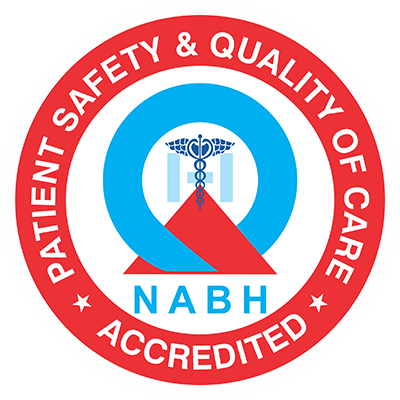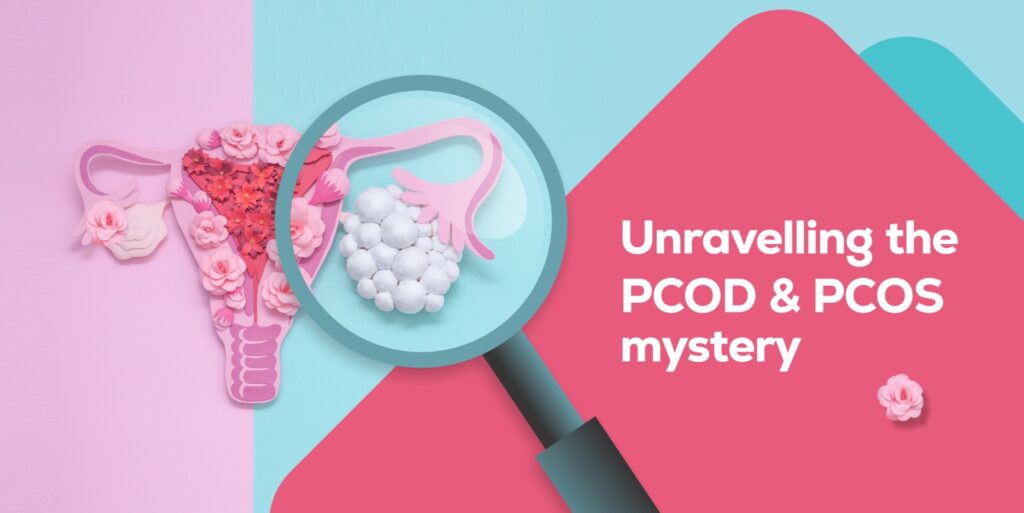Polycystic Ovary Syndrome (PCOS) and Polycystic Ovary Disease (PCOD) are common endocrine disorders affecting millions of women around the globe. In India, these conditions are particularly prevalent, with studies suggesting that approximately one in five women suffer from PCOS during their reproductive years.
What are PCOD & PCOS?
Although the terms PCOD and PCOS are often used interchangeably, they refer to different conditions.
PCOD is generally considered less severe. Women with PCOD may have multiple cysts in their ovaries as a result of hormonal imbalances, but they might not experience significant disturbances in their metabolic functions.
PCOS, on the other hand, is a more serious metabolic disorder that involves multiple systems in the body. It is associated with insulin resistance, inflammation, and hormonal imbalances that can affect overall health and lead to long-term complications such as Type 2 Diabetes, Cardiovascular diseases, and Infertility.
Symptoms to watch out for
The symptoms of PCOD and PCOS can overlap but generally include:
- Irregular menstrual cycles: Delays or complete absence of menstruation
- Cysts: PCOD & PCOS are characterised by the presence of multiple ovarian cysts which are generally not harmful and do not need to be removed unless they cause significant complications
- Hirsutism: Excessive hair growth in areas typically common in males, such as the face and back
- Acne and oily skin: Often related to hormonal changes
- Weight gain: Particularly around the waist, and difficult to manage through diet and exercise alone
- Thinning hair: Hair loss from the scalp, similar to male pattern baldness
- Infertility: Difficulty in conceiving due to irregular ovulation
Causes behind PCOD and PCOS
The exact causes of PCOD and PCOS remain unknown, but they are believed to involve a combination of genetic and environmental factors. Insulin resistance, where the body’s cells do not respond normally to insulin, is widely recognised as a key factor in PCOS. This resistance leads to high insulin levels that may further exacerbate hormone imbalances, particularly in increasing androgen levels, which are typical symptoms of PCOS.
Diagnosis and Treatment
Diagnosing PCOD and PCOS involves a combination of ultrasound examinations and blood tests to measure hormone levels. The treatment methodology typically focuses on managing symptoms and may include:
- Lifestyle changes: Diet and exercise are crucial; a diet low in refined sugars and high in fibre can help improve insulin sensitivity.
- Medications: They help regulate menstrual cycles, manage hormonal levels, and help improve ovulation
When no other treatments have been effective or when specific symptoms persist, the doctor may suggest going down the surgical route. The most common surgical procedure is Ovarian drilling. This minimally invasive surgery involves making tiny holes in the ovary with a laser or a fine needle heated with electricity in order to restore normal ovulation by reducing the levels of androgens (male hormones) that are often elevated in PCOS. This procedure might be particularly considered in the case of women who do not respond to fertility medications.
Understanding the differences between PCOD and PCOS is crucial for effective management and treatment. Women suffering from these conditions need accurate diagnosis, comprehensive management, and continuous care, all of which are expertly provided by BBR Hospitals in Hyderabad. With their world-class facilities and expert medical staff, BBR Hospitals is an excellent choice for women seeking treatment for these complex conditions. Whether it’s managing symptoms or addressing the root causes, BBR Hospitals is dedicated to helping women regain control over their health and lead fulfilling lives.
BBR Hospitals stands out as a premier institution for the treatment of all gynecological disorders, including PCOD and PCOS. The hospital is equipped with state-of-the-art facilities and a dedicated team of gynecologists and reproductive health specialists.
Patients at BBR Hospitals benefit from a holistic approach to treatment, which not only targets the immediate symptoms but also the underlying causes of PCOD and PCOS. The hospital’s comprehensive care model includes personalised treatment plans, dietary recommendations, lifestyle modification programs, and continuous support and counseling.
The hospital’s commitment to incorporating the latest in medical research and therapies ensures that patients receive the most effective and advanced treatments available. Moreover, BBR Hospitals has a reputation for its compassionate care, ensuring that every patient’s experience is as comfortable and stress-free as possible.



